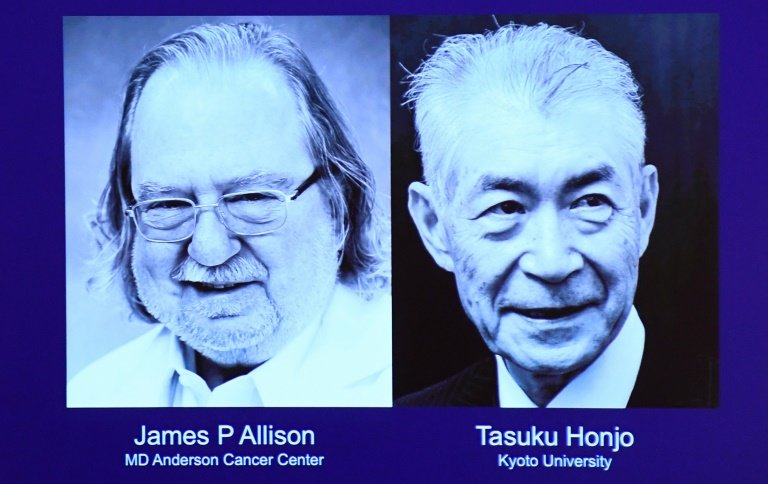Game changing discovery in Cancer therapy
October 1, 2018 | Expert Insights

American James Allison and Japanese Tasuku Honjo won the 2018 Nobel Prize for Physiology or Medicine for discoveries leading to new approaches in harnessing the immune system to fight cancer, the award-giving body said on Monday.
Background
The Nobel Prize is a set of six annual international awards bestowed in several categories by Swedish and Norwegian institutions in recognition of academic, cultural, or scientific advances.
The will of the Swedish scientist Alfred Nobel established the prizes in 1895. The prizes in Chemistry, Literature, Peace, Physics, and Physiology or Medicine were first awarded in 1901.
The Royal Swedish Academy of Sciences awards the Nobel Prize in Physics, the Nobel Prize in Chemistry, and the Sveriges Riksbank Prize in Economic Sciences in Memory of Alfred Nobel; the Nobel Assembly at the Karolinska Institute awards the Nobel Prize in Physiology or Medicine; the Swedish Academy grants the Nobel Prize in Literature; and the Nobel Peace Prize is awarded by the Norwegian Nobel Committee.
Cancer is a group of diseases involving abnormal cell growth with the potential to invade or spread to other parts of the body. Early detection can be useful in treatment. Mortality rates have reduced, but it remains the second leading cause of death globally. The disease is responsible for an estimated 9.6 million deaths in 2018, and until this breakthrough, cancer treatment consisted of surgery, radiation and chemotherapy.
Cancer can be treated by surgery, chemotherapy, radiation therapy, hormonal therapy, targeted therapy (including immunotherapy such as monoclonal antibody therapy) and synthetic lethality. The choice of therapy depends upon the location and grade of a tumour and the stage of the disease, as well as the general state of the patient.
Because "cancer" refers to a class of diseases, it is unlikely that there will ever be a single "cure for cancer" any more than there will be a single treatment for all infectious diseases.
Analysis
The 2018 Nobel Prize in physiology or medicine has been awarded to James P. Allison, from the University of Texas MD Anderson Cancer Center in Houston, and Takusu Honjo, from Kyoto University in Japan, "for their discovery of cancer therapy by inhibition of negative immune regulation."
James Allison and Tasuku Honjo will share the 9m Swedish kronor (£775,000) prize, announced by the Nobel Assembly at the Karolinska Institute in Stockholm. Medicine is the first of the Nobel Prizes awarded each year. This type of therapy is a new approach to cancer treatment. Instead of targeting the tumour cells themselves, it releases the brakes on immune cells, allowing them to attack cancer cells. The drugs that have been developed from their discoveries are known as checkpoint inhibitors.
Both laureates studied proteins that prevent the body and its main immune cells, known as T-cells, from attacking tumour cells effectively. The discovery is transforming cancer treatments and has led to a new class of drugs that work by switching off the braking mechanism, prompting the immune cells to attack cancer cells. The drugs have significant side-effects but have been shown to be effective – including, in some cases, against late-stage cancers that were previously untreatable.
Allison, an immunologist, studied a protein receptor called CTLA-4 on T-cells, which acted as a brake to keep the immune system under control. He realized that by blocking that brake the immune cells could be unleashed on tumour cells, and he began developing therapies based on that principle. In 2011 a drug based on CTLA-4, ipilimumab, was approved for treating melanoma. More than 20% of people using the drug have complete remission from the disease.
Honjo, also an immunologist, discovered a second receptor called PD-1 that also acted as a brake, but with a different mechanism of action. This discovery has also proved to be effective in developing treatments. Two drugs based on PD-1 inhibition, nivolumab and pembrolizumab, have been approved for treating melanoma and lung cancer.
Allison said: “I’m honoured and humbled to receive this prestigious recognition. A driving motivation for scientists is simply to push the frontiers of knowledge. I didn’t set out to study cancer, but to understand the biology of T cells, these incredible cells that travel our bodies and work to protect us.”
Prof. Charlie Swanton, Cancer Research UK’s chief clinician and a senior scientist at the Francis Crick Institute in London, said the discovery of checkpoint molecules on immune and cancer cells has transformed the field’s understanding of the potential of the human immune system to control or even eradicate tumours.
“Over the last decade, work from both these Nobel prize winners has led to the development in the clinic of a new class of therapies – so-called checkpoint inhibitor therapies – that are transforming the management of haematological and solid tumours,” he said. “A decade ago, metastatic melanoma was largely incurable. Thanks to work from Allison and Honjo, patients now have real hope, with over a third of patients deriving long-term benefit and even cures from such therapies.”
Allison’s former colleague, Prof. Sergio Quezada of University College London, watched the announcement along with other former lab mates who will see Allison later today at a cancer conference in New York. “The work that Jim and Honjo did was so seminal that people had been waiting for a few years for it [to win a Nobel],” he said.
According to Quezada, the idea of mobilising the immune system to tackle cancer first emerged more than 100 years ago, but it was only when these two scientists found a crucial missing piece of the puzzle - how to remove the brakes that cancer places on the immune system - that the concept could be translated into a treatment.
Assessment
Our assessment is that checkpoint inhibitors have provided a successful treatment paradigm for many different kinds of cancer, in particular, melanoma. They also show promise for lung cancer, kidney cancer and lymphoma. We feel combinations of the two types can be even more effective.








Comments